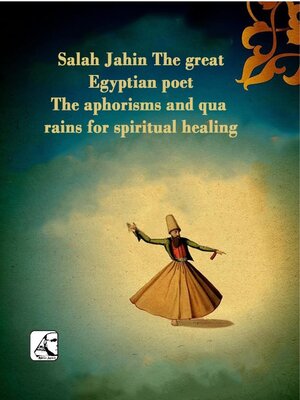Aphorisms and quatrains for spiritual healing. the great Egyptian poet by Salah jaheen
ebook
By salah jaheen

Sign up to save your library
With an OverDrive account, you can save your favorite libraries for at-a-glance information about availability. Find out more about OverDrive accounts.
Find this title in Libby, the library reading app by OverDrive.



Search for a digital library with this title
Title found at these libraries:
| Library Name | Distance |
|---|---|
| Loading... |
Mohamed Salah El-Din Bahgat Ahmed Helmy is a pioneering Egyptian poet, lyricist, playwright and cartoonist.
Jahin was born in the Shubra district of Cairo in 1930 into a middle-class family. He studied law at Cairo University. In 1955 he started working for the Egyptian weekly magazine "Rose El-Youssef" as a cartoonist. A year later, he moved to the new magazine "Sabah Al-Khair", which he became its editor-in-chief, then joined Al-Ahram.
Together with Fouad Haddad, Jahin had a major role in the development of Egyptian colloquial poetry. In fact, the term "colloquial poetry" or "Arab colloquial poetry" was not coined until 1961 by a group of young poets including Salah Jahin, Abd al-Rahman Abnoudi, Fouad Qaoud, and Sayyid Hijab who called themselves Jami'. Ibn Arous". Prior to this, poetry in colloquial Egyptian Arabic was considered a folkloric and low art produced by and for uneducated masses, while the term "poetry" was restricted to poetry written in Modern Standard Arabic (known as "fu'a", meaning more eloquent).
He wrote several plays for the puppet theatre. He was also famous for his patriotic and patriotic songs that marked the revolutionary era of the role of Gamal Abdel Nasser, many of which were presented by the famous Egyptian singer Abdel Halim Hafez. The poet was heavily inspired by the 1952 revolution and was sometimes known as the semi-official poet of the revolution. However, after Egypt's defeat in the 1967 war and the death of Gamal Abdel Nasser in 1970, he suffered from severe depression. In one interview, he said that with Nasser's death in 1970 and the sudden shift in political orientation he felt increasingly like Hamlet, with Sadat personifying the traitor Claudius. .
In addition to political poetry, Jahin's poems often contain metaphysical and philosophical themes, questioning the purpose of human life, the nature of good and evil, human and divine will, and the limits of human pursuit of freedom and happiness.
In 1965, Jahin was awarded the Egyptian Order of Science and Arts, First Class. He died in 1986 at the age of 55







